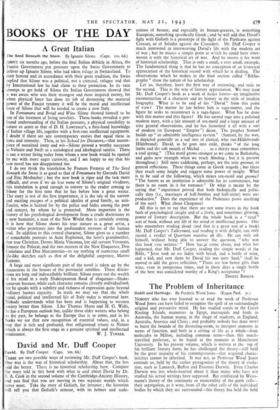BOOKS OF THE DAY -
A Great Italian
The Seed Beneath the Snow. By Ignazio Silone. (Cape. los. 6d.)
Amour six months ago, before the final Italian debacle in Africa, the Fascist Government put pressure upon the Swiss Government to deliver up Ignazio Silone, who had taken refuge in Switzerland. To their honour and in accordance with their great tradition, the Swiss replied that Silone was a political, not a criminal, refugee and that by International law he had claim to their protection. In its vain attempt to get hold of Silone the Italian Government showed that it was aware who was their strongest and most inspired enemy, for when physical force has done its job of destroying the material power of the Fascist tyranny it will be the moral and intellectual force of Silone that will be needed to create a new Italy. In Fontamara and Bread and Wine Silone showed himself to be one of the foremost of living novelists. These. books revealed a pro- found understanding of the Italian peasants, a physical sensibility to nature as acute as that of D. H. Lawrence's, a first-hand knowledge of Italian village life, together with a first-rate intellectual equipment. I doubt if there are any contemporary stories that equal these in force and intensity. Then, in his School for Dictators,—that master- piece of sustained irony and wit—Silone proved a worthy successor to Voltaire and Swift as a sociological and ideological satirist. There is not a wnter living today from whom a new book would be opened by me with more eager curiosity, and I am happy to say that his new novel has not disappointed me.
I do not think the translation by Frances Frenaye of The Seed Beneath the Snow is as good as that of Fontamara by Gwenda David and Eric Mosbacher ; but the new book is riper and the task more difficult, and even if we do lcse some of Silone's original vividness, this translation is good enough to convey to the reader coming to Silone for the first time that he has before him a great writer. The story is not of the first importance, it is the tale of the narrow and exciting escapes of a political idealist of good family, an anti- Fascist, who is hunted for by the police and hides among the poor and outcast, by whom he is protected. More important is the history of his psychological development from a crude doctrinaire to a new humanist, a man of the New World that is certainly coming. It is here that Silone shows his true stature as a great artist, a writer who penetrates into the profoundest recesses of the human soul. In addition to this central character, Silone gives us a number of remarkable portraits in Aunt Euphemia, the hero's grandmother, that true Christian, Donna Maria Vincenza, her old servant Venanzio, Simone the Polecat, and the two masters of the New Eloquence, Don Coriolano and Don Marcantonio—to say nothing of numerous small life-like sketches such as that of the delightful carpenter, Mastro Eutimio.
A large and most significant pin of the novel is taken up by the discussions in the houses of the provincial notables. These discus- sions are long and indescribably brilliant. Silone pours out the wealth of his mind in a truly Shakespearean flood of eloquence—Shake- spearean because, while each character remains cleverly individualised, yet he speaks with a subtlety and richness of expression quite beyond ordinary human capacity. In truth we may say that the whole racial, political and intellectual life of Italy today is mirrored here. Nobody understands what has been and is happening to western society better than Silone. Like Thomas Mann and H. G. Wells, he has a European outlook but, unlike these older writers who belong to the past, he belongs to the Europe that is to come, and in his books we see that new recognition of essential values, and, in a way that is rich and profound, that enlightened return to Nature which is always the first stage in a genuine spiritual and intellectual


























 Previous page
Previous page